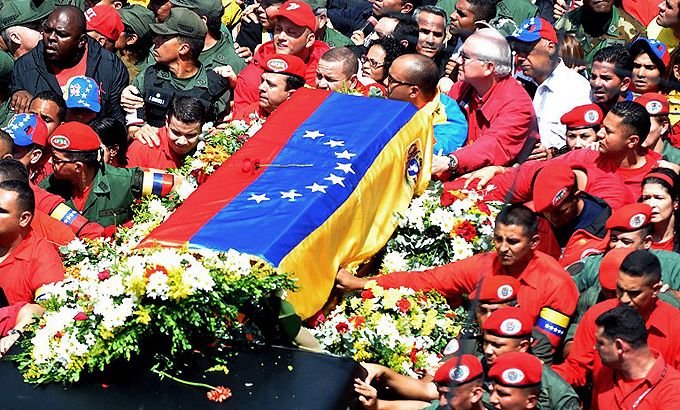Venezuela begins mourning for Hugo Chavez
Thousands jam streets of Caracas as late president’s body is moved to military academy in advance of state funeral.

Venezuelans have begun seven days of national mourning after the announcement that their president, Hugo Chavez, died aged 58 after a long battle against cancer.
His coffin was taken on Wednesday from the military hospital where he died to a military academy he considered to be his second home.
Chavez’s body will lie in state at the tip of a grand esplanade until his state funeral on Friday.
Armed forces across the country fired a 21-gun salute in his honour. They will fire another cannon shot “every hour until his burial”, the armed forces said.
All schools and universities have been shut for the week.
Hundreds of people spent the night in front of his hospital, waving Venezuelan flags and chanting “We are all Chavez!”
A banner was hung the hospital fence, reading “Chavez lives, the battle continues!”
Meanwhile, head of presidential guard has said that Chavez died of heart attack.
The country’s vice-president, Nicolas Maduro – tipped as a likely successor – broke the news of Chavez’s death on Tuesday night, prompting a wave of grief on the nation’s streets.
‘Challenging time’
Some of Chavez’s closest allies arrived on Wednesday in preparation for the state funeral, including Argentine President Cristina Kirchner, Uruguay’s Jose Mujica and Bolivia’s Evo Morales.
The nation’s security forces were deployed following Chavez’s death and Foreign Minister Elias Jaua said calm reigned in the nation, which was once rocked by a short-lived coup against Chavez in 2002.
Chavez’s illness prevented him from taking the oath of office after he was re-elected for a fourth term in October last year.
Venezuela’s closest ally, communist Cuba, declared its own mourning period for a leader who helped prop up the island’s economy with cheap fuel and cash transfers, and dubbed Chavez a “true son” of revolutionary icon Fidel Castro.
A senior minister said a new vote would be called within what are sure to be 30 tense days.
US President Barack Obama – often a target of Chavez’s anti-American scorn – was circumspect, pledging that the US would support the “Venezuelan people” and describing Chavez’s passing as a “challenging time”.
“As Venezuela begins a new chapter in its history, the United States remains committed to policies that promote democratic principles, the rule of law, and respect for human rights,” Obama said.
Shortly before Chavez’s death was announced, Maduro expelled two US military attaches and accused Venezuela’s enemies of somehow afflicting the leftist with the cancer that eventually killed him.
Chavez was showered with tributes from Latin American leaders, not just his allies but also figures like Brazil’s Dilma Rousseff, who hailed him as a “great Latin American” and a “friend of the Brazilian people”.
Iranian President Mahmoud Ahmadinejad said Chavez had fallen “martyr” to a “suspect illness”, while hailing his close ally for “serving the people of Venezuela and defending human and revolutionary values.”
‘Great politician’
Ban Ki-moon, the UN secretary-general, said he is “conveying condolences” to the Venezuelan president’s “family and the people of Venezuela”, Jazeera’s James Bays, reporting from the UN headquarters in New York, said.
Vitaly Churkin, Russia’s ambassador to the UN, also issued as statement describing Chavez’s death as a “tragedy”.
“He was a great politician for his country and for the world as a whole,” Churkin said.
Meanwhile, Morales, the Bolivian president and one of Chavez’s closest allies in Latin America and most loyal disciples, declared that “Chavez is more alive than ever”.
“Chavez will continue to be an inspiration for all peoples who fight for their liberation,” he said on Tuesday in a televised speech.
“Chavez will always be present in all the regions of the world and all social sectors.”
Al Jazeera’s Gabriel Elizondo, reporting from Caracas on Wednesday, said “millions of people” were expected to attend the funeral.
“Chavez is known as a guy who could bring out his supporters and that is what’s going to happen,” our correspondent said.
“He is such a big figure here in Venezuela, you cannot overstate it. He is larger than life”.
Chavez had checked into the hospital on February 18 for a course of chemotherapy after spending two months in Cuba, where in December he had undergone his fourth round of cancer surgery since June 2011.
The once ubiquitous presence on state television and radio disappeared from public view after he was flown to Cuba on December 10, an unprecedented absence that prompted wave after wave of rumours.
Senior officials had sent mixed signals about the president’s health for weeks, while the opposition repeatedly accused the government of lying about his condition. The exact nature and location of his cancer was never revealed.
A new election could offer another shot at the presidency to Henrique Capriles, the opposition leader who lost to Chavez in October but insisted on Tuesday that the two men were “adversaries, but never enemies”.
“This is not the time for differences. This is the time for unity, the time for peace,” Capriles said.